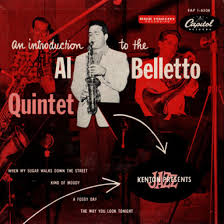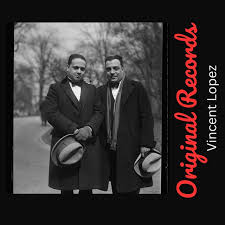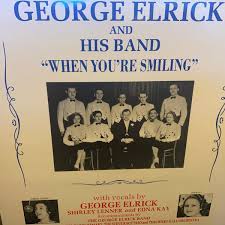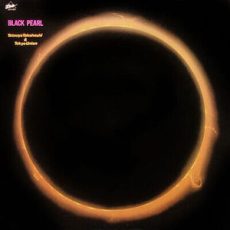
Daily Dose Of Jazz…
Ray Starling was born in London, England on Jauary 4, 1933 and began his musical training on piano. He started playing trumpet when he moved to the United States at age 16. He started his career as a member of the Kai Winding band and played the mellophone on two songs on Kai’s 1960 album The Incredible Kai Winding Trombones.
By the time he joined the Stan Kenton band in 1961, he had made several recordings not only on trumpet but also on flugelhorn and mellophone. He played in, and wrote for, Kenton’s band in 1961 and ’62. He replaced Gene Roland in the mellophone section, while Roland took the arranger position for the band. Starling played on the album Adventures In Blues consisting entirely of original compositions and arrangements by Roland.
After leaving the Kenton outfit, Ray briefly co-led with Joel Kaye the New York Soundstage Orchestra #1 that accompanied vocalists such as Annette Sanders and Tony Bennett. The name changed in the Seventies to the New York Neophonic Orchestra under Kaye’s leadership..
Starling continued to record through the ‘60s, notably in Johnny Richards’ big band and on J.J. Johnson’s 1965 big band album Goodies. He played piano in Buddy Rich’s big band in 1967.
Moving to Phoenix, Arizona is where he spent his remaining years. Trumpeter, mellophonist, pianist and arranger Ray Starling, who also played and recorded with Ray Eberly, Claude Thirnill, Johnny Richards, Sal Salvador, Peter Appleyard and Tony Ortega among others, died on May 15, 1982.
More Posts: arranger,history,instrumental,jazz,mellophone,music,piano,trumpet

Daily Dose Of Jazz…
Al Belletto was born on January 3, 1928 and raised in New Orleans, Louisiana. He graduated from Warren Easton Charter High School before entering Loyola University New Orleans studying music and then earning a master’s degree from Louisiana State University.
Belletto played with Sharkey Bonano, Louis Prima, Wingy Manone and the Dukes of Dixieland in the 1940s and 1950s. He went on to lead his own band and record several albums on Capitol Records from 1952. Along with his ensemble they became part of Woody Herman’s band for U. S. State Department tours of South America in 1958 and 1959.
In the Sixtiess, Al worked at the New Orleans Playboy Club fronting the house band and serving as Musical/Entertainment Director, booking nationally known acts into the venue.
Saxophonist and clarinetist Al Belletto, who recorded six albums as a leader, died on December 26, 2014 in Metairie, Louisiana.
More Posts: bandleader,clarinet,history,instrumental,jazz,music,saxophone

Daily Dose Of Jazz…
Vincent Lopez was born of Portuguese immigrant parents in Brooklyn, New York City on December 30, 1895. By 1916 he was leading his own dance band in New York City. Five years later his band began broadcasting on the new medium of entertainment radio, giving listeners a weekly 90-minute show on Newark, New Jersey station WJZ. The broadcast was instrumental in making him one of North America’s most popular bandleaders through the 1940s.
In the 1930s and ‘40s Vincent worked occasionally in feature films, notably The Big Broadcast and I Don’t Want to Make History and was one of the first bandleaders to work in Soundies movie musicals. His flamboyant style of piano playing influenced Eddy Duchin and Liberace.
Noted musicians who played in his band included Artie Shaw, Xavier Cugat, Jimmy Dorsey, Tommy Dorsey, Bob Effros, Mike Mosiello, Fred Lowery, Joe Tarto and Glenn Miller. He featured singers Keller Sisters and Lynch, Betty Hutton, and Marion Hutton. Lopez’s longtime drummer was Mike Riley, who popularized the novelty hit The Music Goes Round and Round.
In 1941, Lopez’s Orchestra began a residency at Manhattan’s Taft Hotel that lasted 25 years. In the early 1950s, he along with Gloria Parker hosted a radio program broadcast from the Taft Hotel called Shake the Maracas in which audience members competed for small prizes by playing maracas with the orchestra.
Bandleader, pianist and actor Vincent Lopez, who published his autobiography Lopez Speaking in 1960, died at the Villa Maria nursing home in North Miami, Florida on September 20, 1975.
More Posts: bandleader,history,instrumental,jazz,music,piano

Daily Dose Of Jazz…
George Connell Elrick was born on December 29, 1903 in Aberdeen, Scotland. His first ambition was to be a doctor but financial constraints prevented this. Still in his teens, he began playing drums for local dance bands and by 1928 had formed his own band, the Embassy Band. The group swept the prizes in the All-Scottish Dance Band Championship that year.
Turning professional, George moved to London, England where he became friends with the crooner Al Bowlly, and began singing himself. He joined the Henry Hall Orchestra as a vocalist and drummer and their 1936 recording of The Music Goes Round and Round made him a star. Leaving Hall in 1937 he formed his own band, and two years later began his solo career, which was moderately successful through the years of World War II.
In 1948, he took a touring revue around Britain, and was asked by the BBC to stand in for two weeks as disc-jockey on the morning record request show Housewives’ Choice. The temporary job lasted almost twenty years, as his Scottish accent and liberal use of catchphrases became highly popular.
In later years, he became something of an impresario and acted as an agent for numerous musicians such as Mantovani. He was a member of the Grand Order of Water Rats, and was also a life member of the Variety Club of Great Britain.
Drummer George Elrick, who published his autobiography titled Housewives’ Choice: The George Elrick Story, died on December 15, 1999.
More Posts: bandleader,drums,instrumental,jazz,music,vocals

Daily Dose Of Jazz…
Tatsuya Takahashi was born on December 24, 1931 in Tsuruoka, Yamagata, Japan.
In the early 1950s Tatsuya played on US military bases and later in the decade moved to Tokyo, Japan. He worked with Keiichiro Ebihara from 1961, and by 1966 was leading his own ensemble, Tokyo Union, which remained active until 1989.
The 1970s saw him playing at the Monterey and Montreux Jazz Festivals. After leaving Tokyo Union, Takahashi worked in jazz education, and in 1996 founded a new ensemble, Jazz Groovys.
Saxophonist Tatsuya Takahashi died on February 29, 2008 in Tokyo, Japan.
More Posts: bandleader,history,instrumental,jazz,music,saxophone



